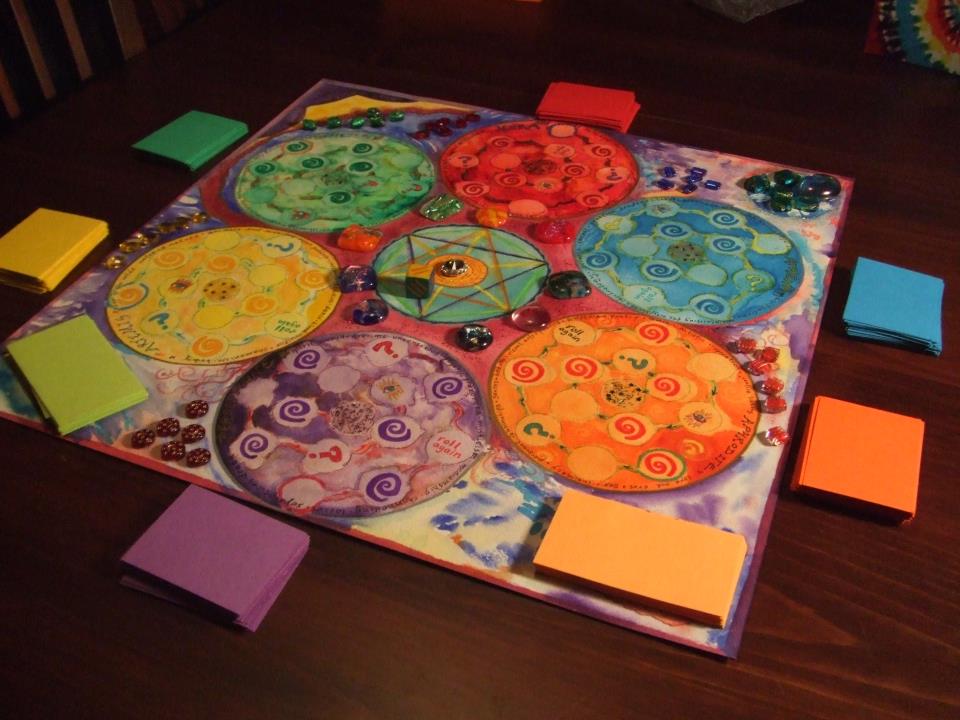Find your inner goddess with a new board game
By Suzanne Thompson
What woman hasn't wanted to be a goddess, at least for a few hours? Two local women have decided we all deserve to think and act like goddesses and created a saucy board game so we can.
http://www.whatwouldgoddessdogame.com

What Would Goddess Do? Game (WWGD?), created by Chelle Messina, of Groton, and Margaret Tyler, of Pawcatuck, is being released this week as the ultimate girls' weekend game. It's uniquely female, Messina says, because it's all about the journey, not winning, and players get to add content to the game and make it their own.
The two friends hit upon the idea in 2003, driving back from a girlfriends weekend with close but geographically scattered friends. Some of the women had known each other for 40 years. It was the kind of reunion that revolves around food, wine, reading books and poetry aloud, plus raucous discussions, a bit of truth-or-dare and lots of laughter.
Messina and Tyler joked about how Greek goddesses would have handled some of the situations they had hashed over. They decided to create a game for the next year's get-together, picking their favorite Greek goddesses and crafting cards with intriguing, real-life situations, from love life to work and raising kids.
"Some of the situations are profound, some are a bit risqué, and some are very silly," says Tyler, who also is an opera singer.
They unveiled and played the first What Would Goddess Do? game on Mother's Day weekend 2006. As the stack of playing cards grew, they realized the game had universal appeal to adult women, and with, as they put it, "open-minded" men.
"Our game is a combination of history, group therapy and bawdy humor wrapped up in swirls of color," says Messina, an artist. "It invites you to imagine, laugh, play and connect with others. Women need that. It's restorative, it's empowering. But it's not your mother's Bunco game."
Imagine a richly colored game board, with six Greek goddesses, each in her own realm. There's Hera, the goddess of marriage and power; Aphrodite, the goddess of love; moon goddess Artemis; Demeter, the goddess of fertility and nurturing; Athena, the goddess of wisdom; and Persephone, goddess of the spirit world, dreams and transformation. Players don't have to be Greek mythology experts; the traits of each goddess are inscribed on the gameboard.
The rules are flexible, and the oldest player is given the role of crone, with ultimate powers. She can change the game rules, or set time limits on long-winded storytellers.
"We decided age and wisdom should be rewarded," says Tyler. "That's the opposite of our youth-oriented society today."
Players will have to tell some personal stories, plus draw from the stack of 380 cards.
"When you are in the goddess realm, you answer as if you were her," says Tyler, pointing out that Aphrodite, the goddess of love, would have a very different reaction to a guy hitting on her in the bar than Hera, who is all about status and maintaining her dignity.
Players keep drawing cards, based on the toss of a die, aiming to get to the center of their realm. They may get derailed on the way, or sent back a few places. Or, they could land in a fire-pit.
"The fire-pit cards are akin to wild cards," Tyler explains. Players might have to tell who their favorite childhood hero was or have to imitate their mother for two minutes.
Once a player gets to the center of a goddess realm, she has to earn the "nugget," or a playing piece. This is done by drawing a goddess card and discussing how the player is like that goddess, or could be more so, or relating how someone else has those traits.
To finish the game, all of the other players write down how they would respond to a situation, and the player holding the nuggets has to guess who said what. But the other players can lie about their answers, too.
"The way you win the game is to make a card for future games," says Messina. "When people make their own cards, it becomes about them, it's a living game."
Players also can go online to the game's website and suggest a card, which might be included in a future expansion of the deck, or give a testimonial about playing the game.
The game is designed to be played in anywhere from a couple of hours to as long as players last. Messina said the longest continuous game so far went from 7 p.m. to 3 a.m.
Messina and Tyler are producing and marketing the game themselves, both as a labor of love and necessity. It has been a painstaking process to trademark the game and artwork, to find printers and work with box engineers.
"When we brought it to game companies, they didn't understand what it was, and they wanted to dumb it down," Tyler says. "We searched for years for somebody who was capable of doing this the way we wanted it to be done, so we decided to do it ourselves."
The game, which costs $69, is printed in the United States. It can be bought online at www.whatwouldgoddessdogame.com, where a YouTube video clip explains how to play.
Or, go to the first official WWGD? release party at 6 p.m. Friday at Home Wellness Center, 1028A Poquonnock Road, Groton.
Tyler notes, "It really brings people out of their shells, it's a beautiful sharing experience."